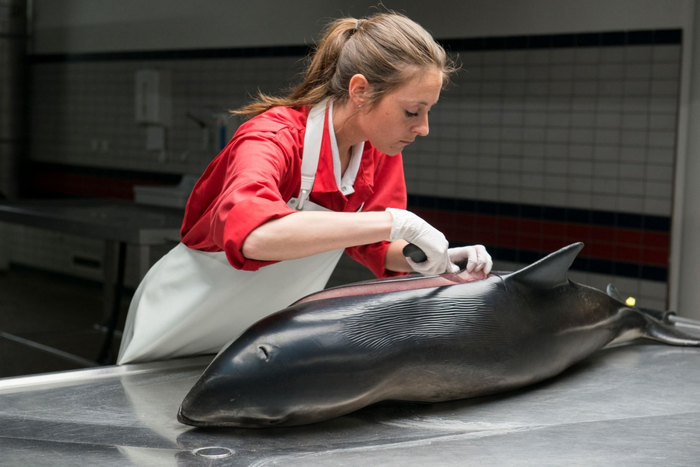The reproduction of harbour porpoises runts into problems when there is not enough high quality food like high caloric fish available, or when the animals are in poor condition. This is one of the conclusions of the PhD research of Lonneke IJsseldijk, researcher at Utrecht University.

Credit: Photo: Bas Niemans
The reproduction of harbour porpoises runts into problems when there is not enough high quality food like high caloric fish available, or when the animals are in poor condition. This is one of the conclusions of the PhD research of Lonneke IJsseldijk, researcher at Utrecht University.
IJsseldijk’s thesis, “Living on a knife-edge: Unravelling harbour porpoise health through multidisciplinary and cross-border approaches”, examines the dangers facing porpoises and the importance of international cooperation for teir protection. Some of the results of her research appeared the scientific journal Scientific Reports on November 2.
In many marine mammals, problems in reproduction were historically linked to polychlorinatedbiphenyls (PCB’s), ubiquitous chemical pollutants in the environment. The importance of other factors has remained understudied, until now. The new study examined if food can play a role during reproduction, in addition to chemicals.
Fat and muscle mass as a measure of health
This was done using an extensively studied cetacean; the harbour porpoise (Phocoena phocoena). IJsseldijk and her colleagues used data on disease, diet, fat and muscle mass - obtained from stranded and post-mortem investigated porpoises. In this way they examined, among other things, whether pregnancy and fetal growth are related to good nutrition and health.
IJsseldijk: “Our analyses showed that females with poor health were less likely to be pregnant, interrupted their pregnancies more often, and their fetuses grew less well.” These results suggest that weaker or sicker mothers may not be able to successfully complete a pregnancy. IJsseldijk: “Our research shows how important it is for porpoises to eat prey with a high energy density: high caloric fish. This is crucial for the reproductive success and ultimately the population size of the harbour porpoise.”
Recent mass stranding porpoises
Research on the harbour porpoise is far from complete, and the sea continues to surprise researchers. At the end of August, many dead porpoises suddenly stranded on the Dutch Wadden Islands. Most of these animals turned out to be adult females who had recently become pregnant. This mass stranding is still being investigated. A multidisciplinary team of researchers from the Universities of Utrecht, Wageningen and Rotterdam, TNO and governmental organisations, is looking into the health and origins of these animals. They will also investigate whether there are indications of trauma, harmful algae and infectious diseases. The first results of this study are expected later this year – probably at the end of November.
Lonneke IJsseldijk will defend her PhD thesis “Living on a knife-edge: Unravelling harbour porpoise health through multidisciplinary and cross-border approaches” on November 2, 2021 at 16:15 CET in the Academiegebouw of Utrecht University.
Her defense can be followed online at: https://www.uu.nl/agenda/promotie-living-on-a-knife-edge-unravelling-harbour-porpoise-health-through-multidisciplinary-and.
The thesis can be read online at: https://www.globalacademicpress.com/ebooks/lonneke_ijsseldijk/.
Also see https://www.uu.nl/en/research/strandings-investigation/research for more information on Lonneke IJsseldijk’s research.
Journal
Scientific Reports
DOI
10.1038/s41598-021-98629-x
Method of Research
Experimental study
Subject of Research
Animals
Article Title
Nutritional status and prey energy density govern reproductive success in a small cetacean
Article Publication Date
2-Nov-2021




